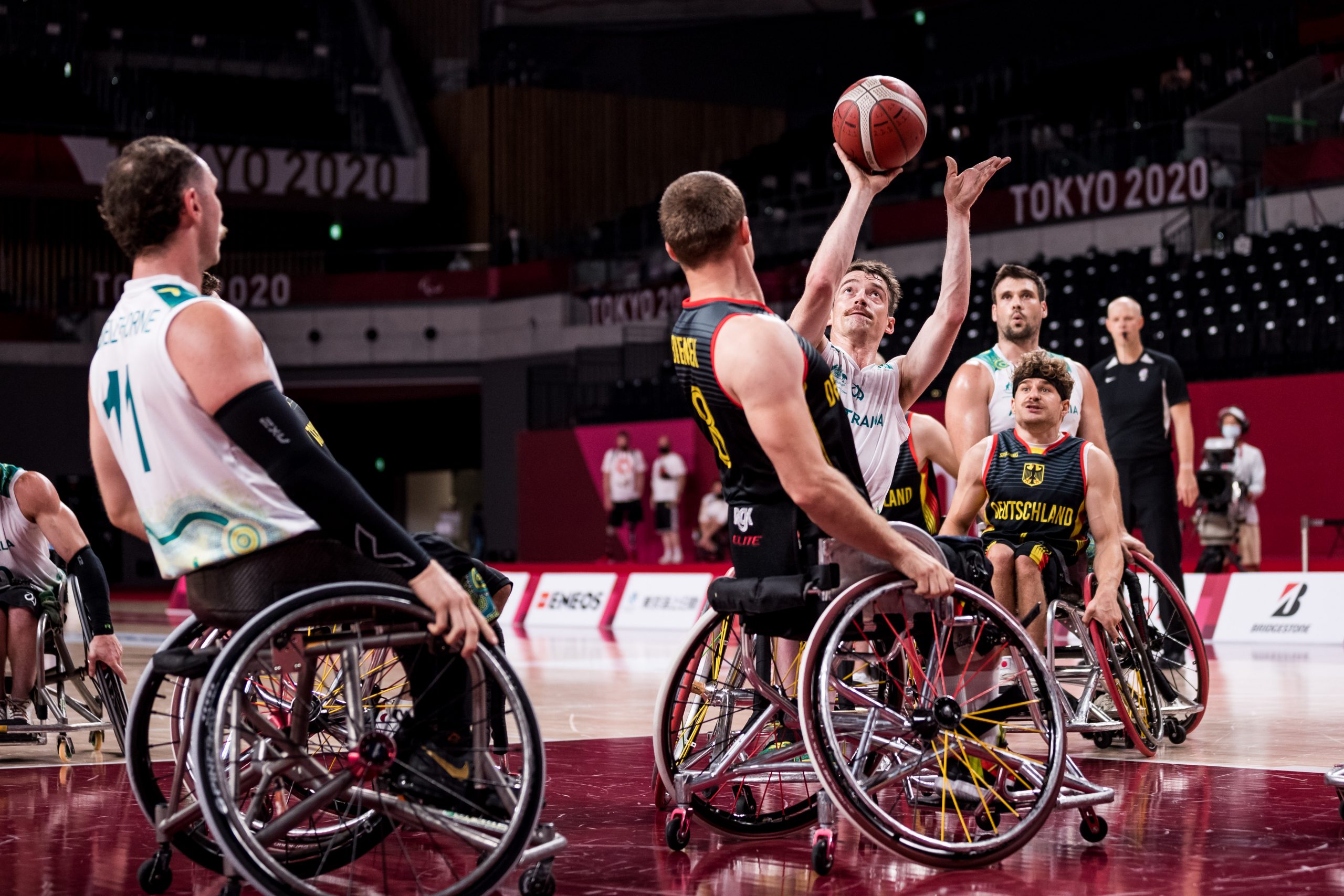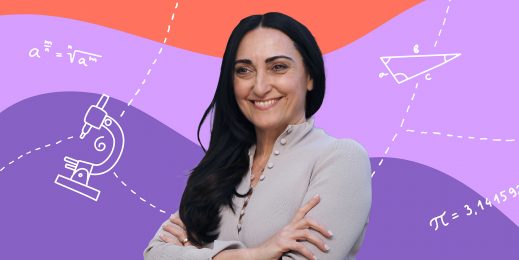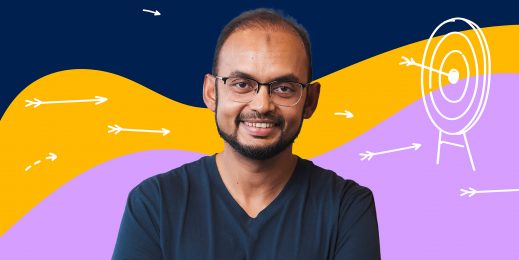
Hoop dreams: Microsoft’s Kim Robins never stopped believing he would play basketball in the Paralympics
Kim Robins made the vow when he was 12. He and his parents had traveled more than 2,400 miles from their home in Perth, Australia east to Sydney to see the summer Paralympic games, held shortly after the Olympic games, as is tradition. The Paralympic games, for athletes who are disabled, are held after the winter and summer Olympics and in the same city.
The trip across country in 2000 was a present from his parents before Kim faced yet another in a series of major surgeries. He was born with a neural tube defect causing his spine to form incorrectly in utero, leaving him unable to walk on his own.
“We were going every day to the games, and one time when we were catching a train to them, some people asked Kim what his favorite sport was,” says his mother, Debbie Robins.
He said it was basketball, and that one day he was going to play for Australia in the Paralympics.
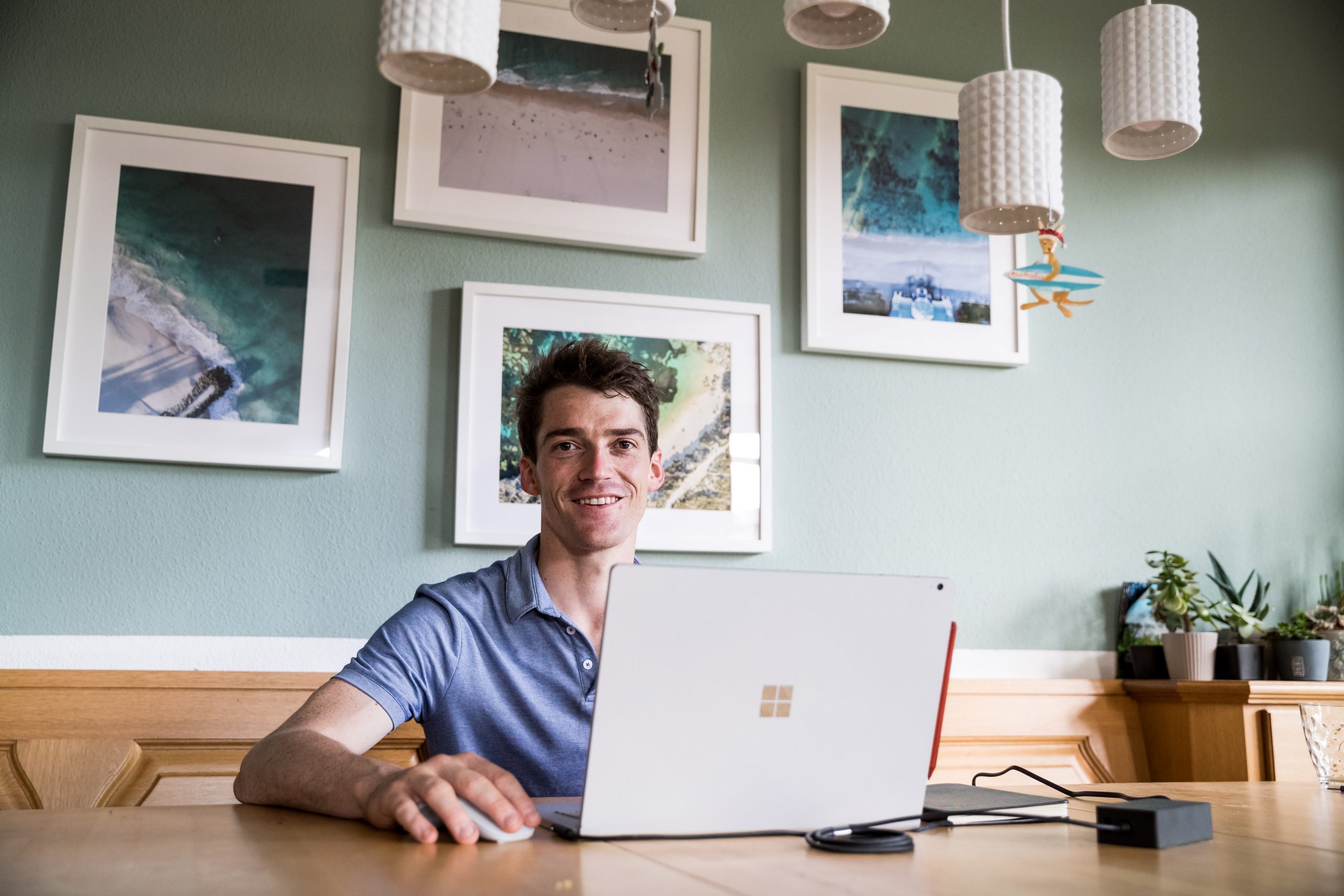
Fast forward 21 years. Kim Robins’ name was on the roster of an Australian men’s wheelchair basketball team – they’re called “The Rollers” – at the Paralympics, Aug. 24-Sept. 5 in Tokyo.
“I guess it maybe took me a little bit longer to get here,” says Robins, 33. “My journey was much more complex than I thought it would be. But I’m very proud of all the things I had to overcome to get here and take that journey.”
Craig Friday, head coach of the Australian men’s wheelchair basketball team for the Paralympics, says Robins’ “desire to be better and make others better around him is infectious. Kim is very unselfish in his approach and is willing to sacrifice his game for the better of the team.”
Robins brings the same approach to his work life, as a Microsoft solution specialist in Munich, Germany, working with clients in the finance and insurance industry.
“He has a lot of empathy, and you see how he engages with his teammates and with customers, how he looks to make sure that everybody is included and feels good,” says his manager, Hendrik Juelich.
It is, in part, a result of that journey that Robins has taken, one that could have gone in so many other directions.
‘My parents always challenged me’
Debbie and Wayne Robins were overjoyed when their son was born in 1988, a younger brother to their 5-year-old daughter. It wasn’t until he was about a year old and started missing some development milestones, such as being able to roll over by himself, that doctors started trying to diagnose what happened.
Testing revealed a neural tube defect, which can occur within weeks of conception. A baby’s brain and spinal cord develop from the neural tube, and if the tube does not close correctly, it can result in abnormalities like the one Kim has. Other neural tube defects include spina bifida and anencephaly.
Doctors weren’t optimistic about Robins’ future. “They said he’d never walk, he’d never play, he’d never do lots of things,” says Debbie Robins. “Kim’s neural tube defect is quite rare, so they didn’t know how it would affect him long-term.”
He couldn’t sit up by himself. There were years of physiotherapy and occupational therapy, and starting at age 2, therapeutic horseback riding. Multiple surgeries to try to help. He was 3 before he could walk with crutches and the use of a walker. And there was chronic pain, something he still lives with.
“That has been one of the worst parts,” Debbie Robins says. “Because as a child, no medications were helping or made a lot of difference, so it was about trying to get him to cope with the amount of pain he had.”
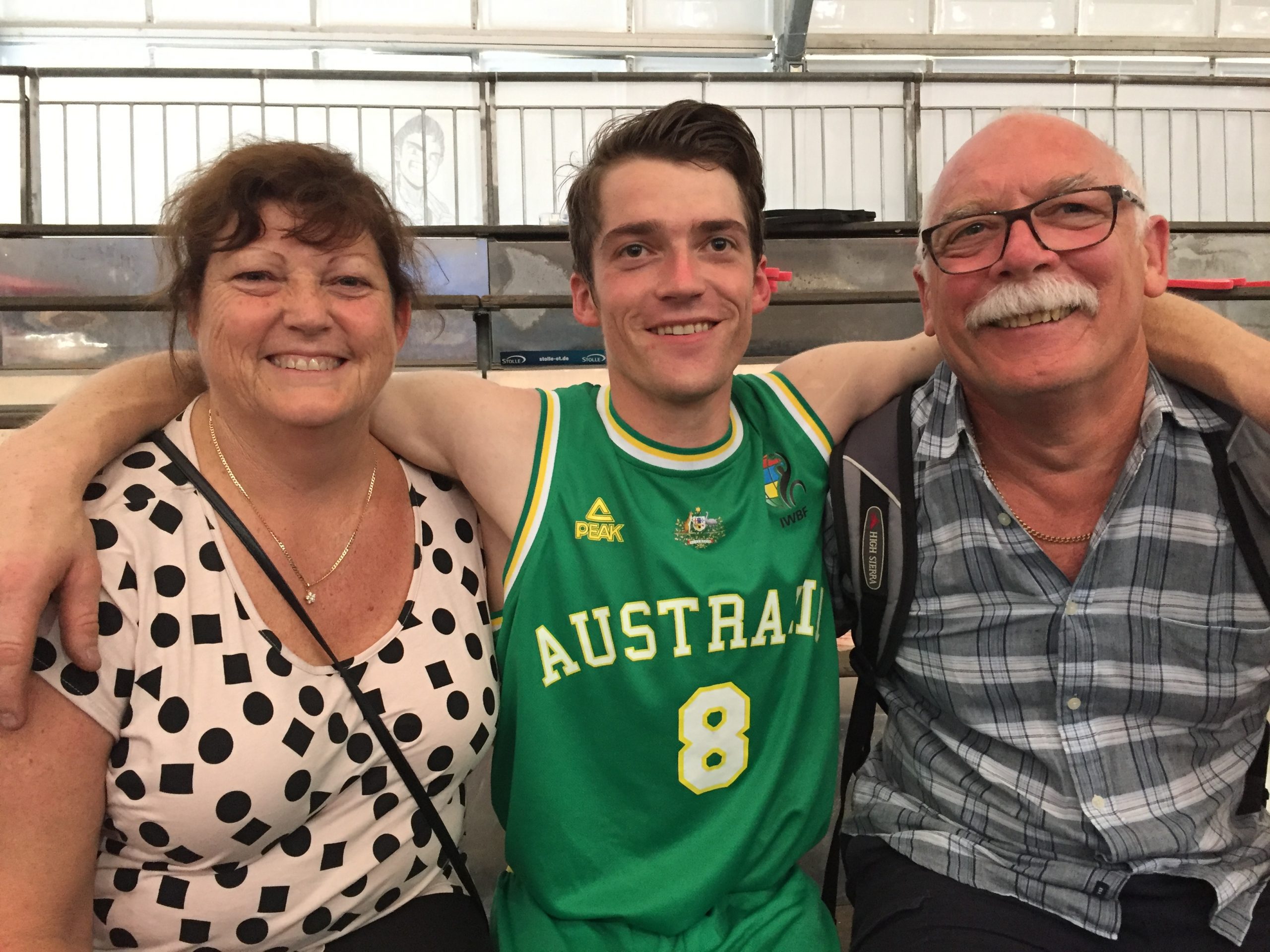
Significant research in Australia about neural tube defects paralleled Robins’ young years. In 1989, Dr. Fiona Stanley and university professor Carol Bower pioneered additional research between a lack of folate, or folic acid, in a mother’s diet and neural tube defects. In 1992, Kim was a poster child for an education and awareness campaign by The Telethon Kids Institute, a research institute founded by Dr. Stanley, which resulted in a substantial decrease in the number of children in Australia born with neural tube defects. And in 2009, the Australian government required folate to be added to bread-making flour.
When Kim was about 6, he had a difficult time at school. “He was sitting in the corner and wouldn’t talk to anybody,” says his father, Wayne Robins. . “But when a tutor came in to help, he said what Kim needed was not tutoring, but self-esteem, and that sport was a way to introduce him to that.”
Soon after, his parents took Kim to watch a basketball game played by wheelchair athletes. The little boy was “stunned” and thrilled, Wayne Robins said. “He’d never seen so many people in wheelchairs. And he’d never seen somebody sit down and take off their prosthetic leg and then get in a wheelchair and play basketball.”
It was love at first sight. From then on, Kim played basketball, but also participated in other sports: tennis, track and field, swimming. All of them resulted in a 180-degree change in his self-confidence.
“We never gave up and Kim didn’t give up either,” says Debbie Robins. “He’s got a pretty strong spirit.”
“I don’t think it’s easy on any family to have a child born with a disability,” Kim Robins says. “Obviously, there were some things that were different for me, like I needed more medical treatment than other kids,” he says.
But my parents always challenged me and encouraged me to pursue sports because they could see how much I enjoyed it.
And it grew to be more than enjoyment – it became like oxygen for Robins. He kept playing basketball and tennis, winning titles in both sports. But training in both became too rigorous, so at 18, he chose to concentrate on basketball, mainly because he liked the team aspect of the sport.
In 2007, Robins became a member of the Perth Wheelcats, a team that plays in the Australian National Wheelchair Basketball League. The Perth Wheelcats won the national championship from 2007-2010, and again in 2013 and 2014.
In addition to playing, Robins started college, ultimately earning a degree in sports science from Edith Cowan University in Perth, and later a master’s degree in finance from the Royal Melbourne Institute of Technology.
His basketball career took him around the world, with some breaks in his college studies. He played in Italy and Spain and in 2012, moved to Germany to play professional wheelchair basketball in the Bundesliga, the country’s national sports league, where he still plays today with the Munich Iguanas. Robins also continued to fly home to Australia for three months a year to play on teams when the Iguanas were not playing.
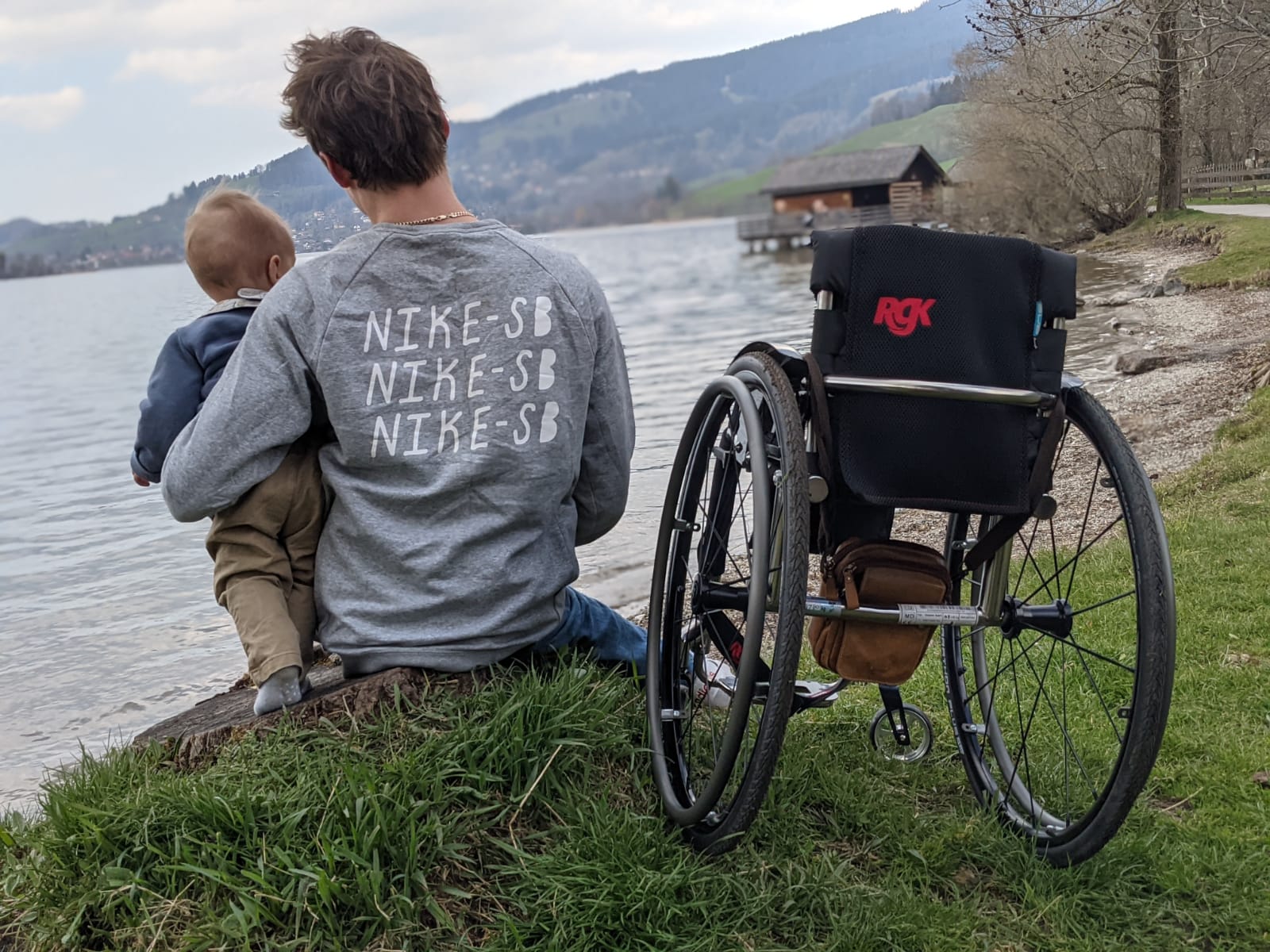
He joined the extended squad of the Australian Rollers, a senior men’s wheelchair basketball team, in 2010, and became a permanent member in 2017. He helped the team advance to the 2018 International Wheelchair Basketball Federation World Championships in Hamburg, Germany, where the Rollers won the bronze medal.
The same year, he married his wife, Jess Durlak, who is German and a teacher – and a basketball fan. The couple had a son, Owen, in 2020 not long after he started working for Microsoft. When he began working remotely because of the pandemic, it provided him with the flexibility he needed for training time, as well as time to be with his wife and son.
With Japan’s decision to move ahead with the Olympics and Paralympics this summer, Robins wasn’t sure if he would qualify to play as part of the Australian team.
Despite his outstanding career, there have been disappointments. “I’ve had some occasions at different world championships where I was in the top group of players, but I just missed out of the top 12,” he says.
None of that deterred him.
In June, Robins flew to Australia, quarantined for two weeks, then participated in the training camp required of those who wanted to make the team. The 12-player roster was announced by Paralympics Australia in July, and Robins was on it.
“Kim has good speed and agility with a high IQ for the game, which makes him a valuable member of the Rollers,” says coach Friday. “His day-to-day challenges to be on court performing at the best of his ability are massive, and he gets it done without complaining or looking for compliments.”
“Paralympians are super stars in the disability community,” says Jessica Rafuse, Microsoft’s director of strategic partnerships and policy for accessibility, who has muscular dystrophy. The Paralympics, she says, are:
One of the very few platforms where we can celebrate the successes of people who look like us and live like us.
While continuing to train in Australia before going to Tokyo, Robins was also doing his Microsoft job, working hours that fit his German team’s and customers’ time zones.
He looks forward to returning to his life with his family after Tokyo. But first there are matches to be played, and a dream to be fulfilled.
“I feel quite lucky to be able to go to my first Paralympics, even if it is later in life,” he says. “I feel like a much stronger athlete, having overcome so many setbacks and challenges. And I think experiencing that journey is what makes you a stronger kind of person.”
